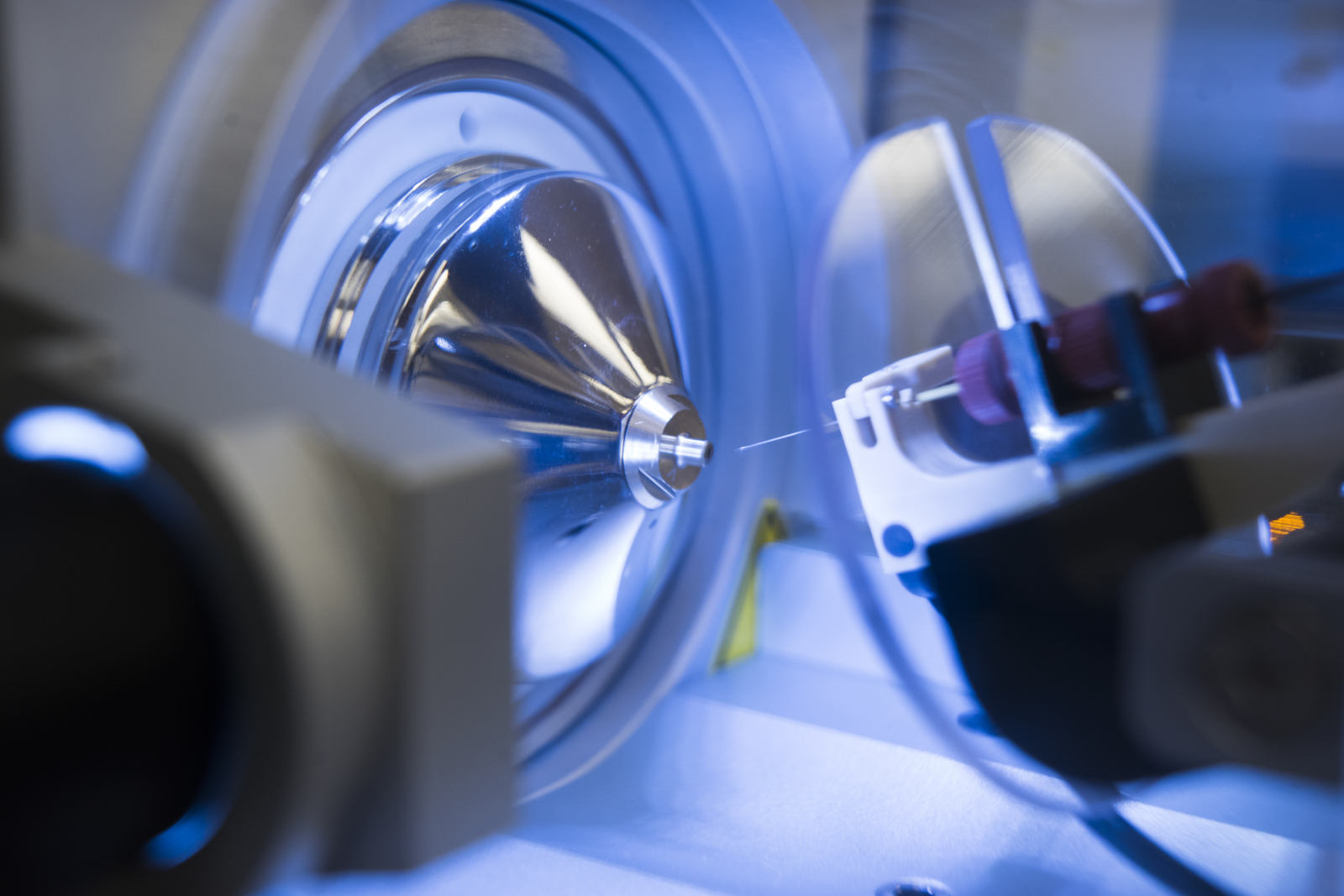About
DESI is an ambient ionization method that facilitates the generation of ions from samples in their native environment with minimal sample preparation. The method allows direct, fast analysis of complex mixtures which are typically not MS-compatible. The unique DESI capability provides access to extremely fast organic reactions that can be accelerated up to a factor 106 compared to bulk, as well as fast sampling rates (>1Hz). Together, the inherent characteristics of DESI and the reaction acceleration DESI a unique alternative for high throughput experimentation as it offers the capabilities of both a synthetic and an analytical tool.
Capabilities
Reaction Screening and nano-scale synthesis
Many common organic reactions can be explored, including:
- Alkenylation
- Alkyl substitution
- Aryl substitution
- Esterification
- Ene click-like reaction
- Epoxide ring-opening reaction
- Fluorosulfurylation
- Fluorosulfonyl-mediated Suzuki coupling reaction
- Mannich-like reaction
- Reductive amination
- Sulfonylation
- Thioesterification
- Thianthrenation
- Carbamate-, Thiocarbamate-, Sulfonate-Amine reaction
Bioanalysis and bioactivity assessment
Many biological molecules can be studied, including enzymes, receptors and transporters, peptides, and lipids. Please contact the core for more information.
Drug candidate screening
Screening for drug candidates in multiple systems is possible, including in cellulo hit confirmation.
Biosample microarrays and biomarker discovery
- Knock-down and mutation studies
- Knock-down and mutation studies
- Direct agar and culture analysis
- Biotyping
- Directed evolution
Instrumentation
The first generation of the HT-DESI-MS technology was built under the DARPA Make It program. It consists of a Biomek i7 liquid handling workstation equipped with a pin tool, a PF3400 SCARA for plate transfer, and a Thermo LTQ XL ion trap mass spectrometer coupled to a Prosolia DESI 2D ion source. Additional capabilities for on-the-fly solvent switching are available through a custom solvent delivery system. The platform is controlled using a custom Python-based software termed CHRIS. This platform is routinely used for organic reaction screening and multi-stage MS (MSn) experiments.
The HT-DESI-MS platform was extended to a second mass spectrometer, a Waters™ Synapt™ G2-Si quadrupole time-of-flight equipped with Traveling Wave Ion Mobility Spectrometry (TWIMS) capabilities, and a 2D DESI stage which includes a Waters™ XS-generation DESI sprayer and a prototype heated transfer line, both of which provide increased robustness and higher ion fluxes. This system is routinely used for higher-sensitivity applications including biological sample screening and biological assays.
This new system was developed as part of the NCATS ASPIRE program in collaboration with Waters Corporation and Hamilton Robotics. It includes a Hamilton Vantage 2.0 fluid handler integrated with a Waters™ Xevo™ G2-XS mass spectrometer equipped with a prototype AutoDESI source. The system also includes an entry/exit device which extends the sample capacity to ca. 100,000 samples per run, with an overall throughput that can be flexibly customized up to 3 Hz. Hardware integration uses a custom enclosure, a track gripper, and an open landing position setup of the AutoDESI source, whereas software integration is based on a custom seamless driver that interfaces Hamilton Venus and the Waters AutoDESI prototype software through JSON messaging. The entire system follows an easy-to-trigger worklist-driven workflow that connects a VBA-backed worklist, a custom Hamilton interface, the Waters™ AutoDESI control, and a custom MATLAB app for data handling. This system is routinely utilized for drug discovery (both synthesis and analysis) projects.
Rates
| Service | Internal | Consortium* | External non-profit** |
|---|---|---|---|
| Liquid handling robot | $41/hr | $31/hr | $84/hr |
| Waters Synapt G2 | $52/hr | $39/hr | $82/hr |
| Thermo Ion Trap | $43 | $30/hr | $90/hr |
